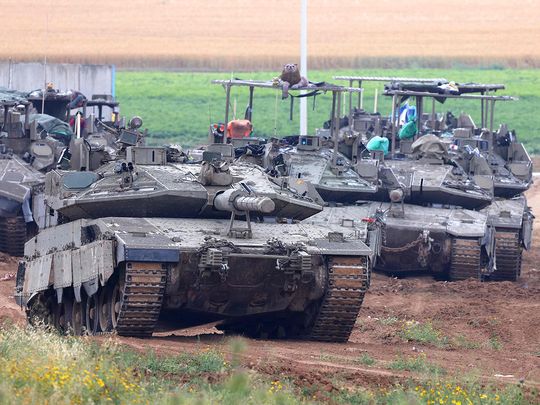
The war in Gaza on Sunday hit the 6-month mark, a grim anniversary of the mayhem unleashed by Israel against the 2.4 million Palestinians living there.
The enclave now is a wasteland from end to end, with almost its entire population displaced. Indeed, after Israeli troops withdrew from Khan Younes last week, townspeople who journeyed six miles back to their town, on foot or on donkey carts, found not a hometown but a moonscape, with virtually every house destroyed and every street bulldozed, along with bodies buried in the rubble, decomposed and recognisable only by the clothes they wore and the IDs found on them.
Nothing moved. No structure that had stood before the war remained standing. Khan Younis was a ghost town, a fate that had in fact been meted out to every other town in Gaza. So ferocious has the onslaught on the Strip been that it can be likened, with no apparent resort to hyperbole, to the destruction of Carthage by the Romans in 149BC and the sacking of Abbasid Baghdad by Hulegu’s Mongolian Hordes in 1258.
Look, if we learnt anything over the last six months, we learnt that, no matter what language you dress it in, Gaza’s war in Gaza is viciously malevolent, its intent — evil to the extreme — being the infliction of as much irremediable suffering on Gazans as it is possible to do so.
Ask this question, as a case in point: What kind of human beings would be those who deliberately and calculatedly deny their starving fellow-human beings access to food? Indeed, one may ask, more troublingly, what kind of human beings would be those who equally deliberately and calculatedly shoot to kill at their starving fellow-human beings reaching for food, in order to prevent them from feeding themselves and their children, as Israeli soldiers did on Feb. 29, when they opened fire on hungry Gazans gathered around an aid delivery convoy, leaving more than 100 dead and 700 injured, in what has become known among Palestinians as the “flour massacre”? (This was a tragedy that followed more than a month of what the UN called a “pattern of Israel’s attacks against civilians desperately seeking food under unprecedented levels of starvation”.)
Let’s say, levity aside, this war has not been Israel’s finest hour in the morals department, an Israel reviled as it has become globally for its government’s hawkish stand, its army’s indiscriminate air strikes against civilian targets and its far-right politicians’ supremacist proclamations.
And, pray tell, what’s been in it for Israel anyhow, after the six months of unprecedented mayhem it has visited on well over two million Palestinian civilians living in the Gaza Strip?
Let’s take stock
It is now clear that Israel’s putatively sophisticated military prowess — prowess made fearsome and ever so deadly thanks to Uncle Sam’s largesse — has not guaranteed it strategic success, which is the elimination of Hamas from the face of the earth, for Hamas’s senior leaders, including its military commander, Yahya Sinwar, are still around, walking that earth, along with thousands of the group’s fighters, who also remain at-large. Israeli captives, as of this writing on Tuesday, are still held in Gaza. And Gazans have not left their strip of land en masse as Israel had hoped they would.
“In the six months of war, we failed to achieve even a single one of our objectives”, wrote prominent Israeli columnist Nahum Barnea in the Israeli daily Yediot Aharonot. “We did not destroy Hamas”.
Meanwhile, the war in Gaza grinds on into its seventh month as Israel gives Washington its back and the world its finger, as if to say, “So, whatcha gonna do about it, heh!”
Nothing, it seems. Though fewer than 5,000 Israeli troops remain in Gaza (down from the 50,000 at the height of the war in December), those who had deployed across the border did so, in the words of an Israeli Army spokesman, in order to “recuperate and prepare for future operations”. And Israel’s commitment to its oft-stated plan to invade Rafah, an invasion that would most assuredly result in a bloodbath and in shining a light on Israel’s insatiable bloodlust, remains solid.
“That will happen”, the New York Times quoted Israel’s prime minister saying on Monday. A date, he added, had “already been set”.
To date, 33,000 Palestinians have been killed. Tomorrow another hundred will follow them. And those in turn will be followed by yet another hundred everyday henceforth — until the US stops supplying Israel with the arms that kill them.
Only the US can put a stop to the madness, but we know this US, for its own twisted reading of the “right of Israel to defend itself”, will not.
Meanwhile, the man in the White House, who thinks Israel’s conduct in Gaza “has been over the top”, is here to tell you that US support for Israel “will remain unwavering”.
So, Joe, let me tell you that I, a Palestinian American voter, will remember this convoluted posture when I cast my ballot in November.
— Fawaz Turki is a noted academic, journalist and author based in Washington DC. He is the author of The Disinherited: Journal of a Palestinian Exile







_resources1_16a45059ca3_small.jpg)

